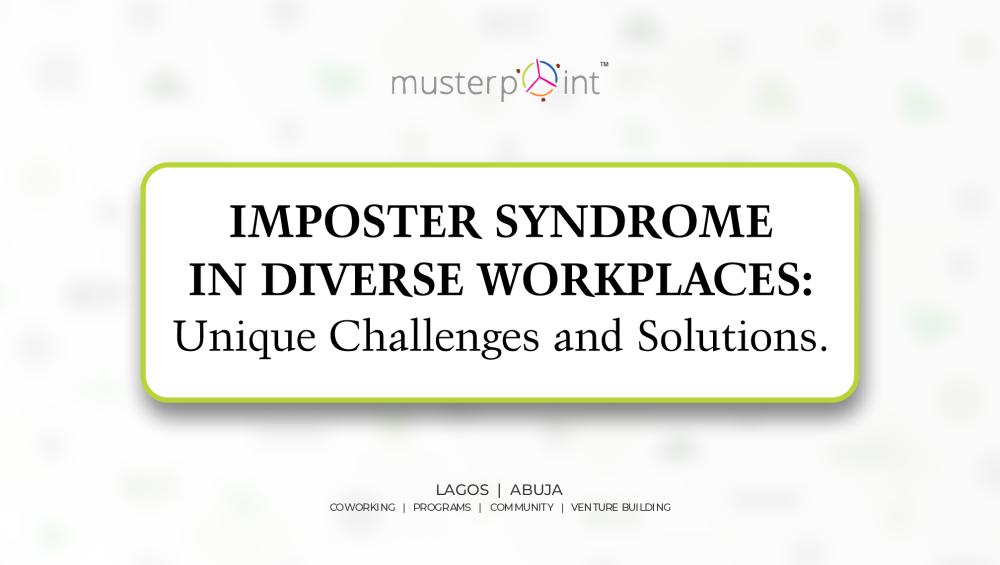Imposter Syndrome is a pervasive issue that affects many individuals in the workplace, regardless of their background. However, in workplaces, that experience can be escalated by unique challenges.
Diversity in the workplace means having an inclusive environment that provides equal rights and opportunities for all workers of different backgrounds (i.e. gender, colour, age, ethnicity, physical ability, sexual orientation, religious beliefs, etc.)
In this blog, we’ll explore what Imposter Syndrome is, its impact on diverse work environments, and practical solutions to overcome it.
Understanding Imposter Syndrome:
Imposter Syndrome is a psychological phenomenon where individuals doubt their abilities.
They fear being exposed as a fraud and believe their accomplishments are a result of luck or deception rather than their skills. It can manifest in various ways, including self-doubt, perfectionism, and chronic anxiety.
Unique Challenges in Diverse Workplaces:
Stereotype Threat: People in diverse workplaces often face stereotypes based on their race, gender, age, or other factors. These stereotypes can intensify imposter syndrome. Employees may feel they must work harder to prove themselves, perpetuating feelings of inadequacy.
Cultural and Linguistic Differences: In global or multicultural workplaces, language barriers and cultural disparities can create additional challenges. Those facing language difficulties or adapting to a different work culture may experience Imposter Syndrome more intensely.
Micro-aggression: Subtle acts of discrimination or bias, can erode self-esteem and contribute to Imposter Syndrome. Diverse workplaces might see an increased occurrence of such micro-aggression.
Lack of Representation: When employees do not see individuals who look like them in leadership positions, they may question their own potential for success, reinforcing imposter syndrome.
Solutions for Overcoming Imposter Syndrome in Diverse Workplaces.
Self-awareness: Recognizing imposter syndrome is the first step to addressing it. Encourage employees to acknowledge their feelings and understand that many others experience the same self-doubt.
Mentorship and Role Models: Encourage mentorship programs and ensure that diverse individuals have access to mentors and role models within the organization. Seeing others who have overcome similar challenges can inspire confidence.
Training and Awareness: Implement diversity and inclusion training to address biases and microaggressions. Fostering a more inclusive work environment can help reduce the instances that trigger Imposter Syndrome.
Affinity Groups: Establish affinity groups or employee resource networks to provide support and a sense of belonging for underrepresented employees. These groups can help individuals share experiences and strategies for coping with Imposter Syndrome.
Performance Feedback and Evaluation: Provide regular and constructive feedback to employees, emphasizing their strengths and accomplishments. This can help individuals develop a more accurate self-perception.
Embrace Failure: Encourage a culture that sees failure as a stepping stone to growth and learning. Employees should be allowed to make mistakes without fearing negative consequences.
Personal Development Plans: Encourage employees to set personal development goals and create plans for achieving them. This can boost their self-confidence and sense of achievement.
Mindfulness and Well-being: Promote mindfulness and well-being programs to help employees manage stress and anxiety, which often exacerbate Imposter Syndrome.
Imposter syndrome is a common challenge in workplaces that can affect employees’ well-being and job performance. The unique challenges faced in competitive, diverse, and high-pressure environments require tailored solutions.
By fostering a supportive culture, offering mentorship, and promoting a growth mindset, companies can help their employees combat imposter syndrome and thrive in their careers.
Addressing this issue not only benefits individual employees but also contributes to a more productive and harmonious workplace.

